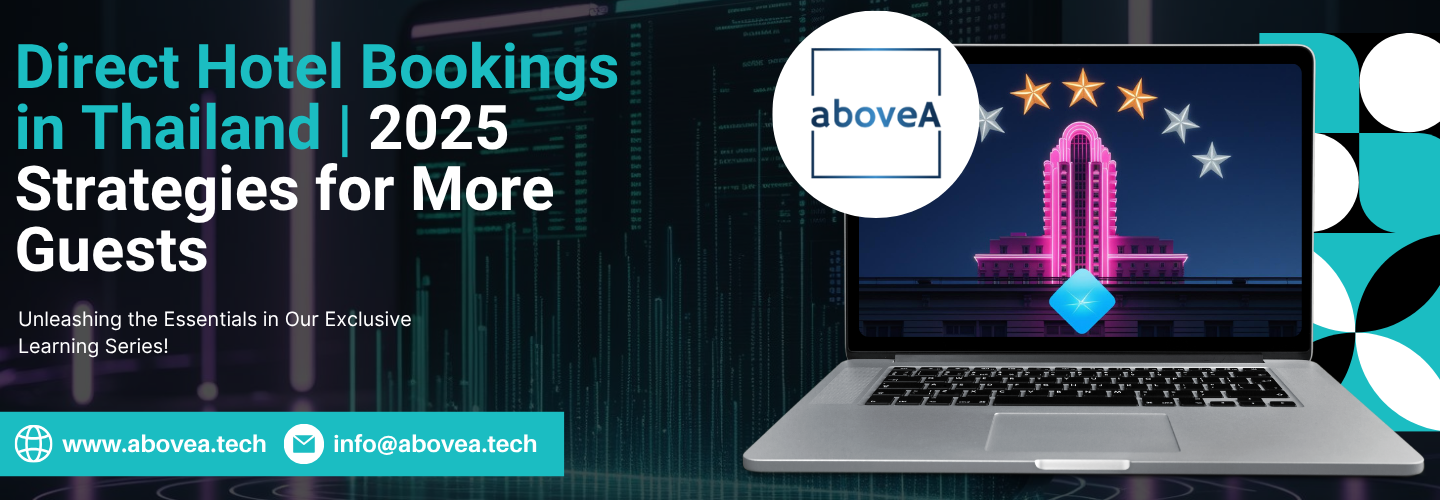
How Thai Hotels Can Get More Direct Bookings in 2025?
Direct bookings for Thai hotels are the lifeline for boosting profit margins, building guest loyalty, and reducing dependency on OTAs (Online Travel Agencies) like Booking.com, Agoda, and Expedia. In 2025, competition in Thailand’s hospitality industry is fierce, from luxury beachfront resorts in Phuket to boutique hotels in Chiang Mai.
With rising OTA commission rates (often 15–25%), every booking made directly through your hotel’s website or contact channels saves you money and gives you complete control over the guest relationship. That means more upsells, better guest experiences, and repeat visits.
The strategies below combine hotel SEO, Google Hotel Ads, social media for hotels, and loyalty programs to help your property rank higher in Google Search, get found on Google Maps, and convert lookers into bookers: without losing revenue to intermediaries.
Why Direct Bookings Matter in 2025?
In the competitive Thai hospitality market, relying only on OTAs puts your business at risk. Here’s why direct bookings should be a core priority:
Higher Margins – Keep the 15–25% commission OTAs take.
Full Control of Guest Data – Know your guests’ preferences, travel history, and contact details for future marketing.
Better Brand Loyalty – Direct guests are more likely to return if they have a great first experience.
Resilience to OTA Policy Changes – No sudden rule or fee changes affecting your revenue.
Upselling Opportunities – Add breakfast packages, tours, spa services during booking.
In 2025, hotels in Thailand that succeed are those that combine local SEO, international travel targeting, and multi-channel marketing to secure more direct reservations.
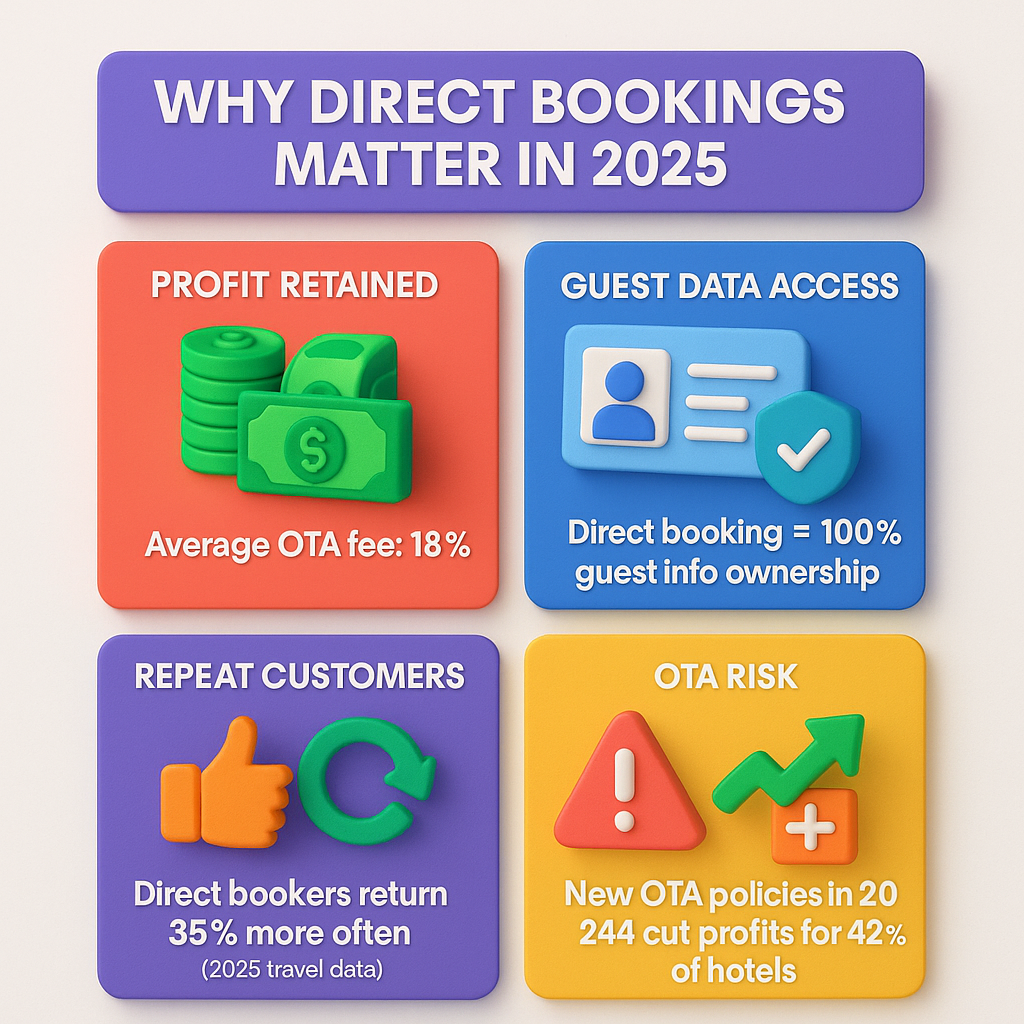
Key Direct Booking Strategies for Thai Hotels
Getting more direct hotel bookings in Thailand requires more than just a functional website. In 2025, guests will compare prices, read reviews, and check social media before deciding where to stay. To outperform OTAs and competitors, Thai hotels must integrate hotel SEO, Google Hotel Ads, multi-language marketing, and loyalty incentives into a unified strategy. The following methods focus on attracting high-intent travelers, guiding them directly to your booking engine, and converting them without losing revenue to third parties.
1. Optimize Your Hotel Website for SEO (Multi-Language & Mobile-First)
Your hotel website must be a 24/7 booking engine. This means fast load speeds, mobile-friendly design, and easy booking forms. For SEO, target location-specific keywords in Thai and English, such as:
“Luxury hotel in Krabi”
“โรงแรมในเชียงใหม่ใกล้ตลาดกลางคืน” (hotel in Chiang Mai near night market)
Add pages for different room types, facilities, and local attractions. Include schema markup for hotels so Google displays prices, ratings, and availability in search results. Multi-language content is critical for capturing international travelers searching in their native language.
2. Leverage Google Hotel Ads & Google Business Profile
Google Hotel Ads puts your property directly in front of travelers searching on Google and Google Maps. When integrated with your booking engine, guests can see real-time rates and book instantly without visiting an OTA.
Your Google Business Profile should be fully optimized with:
Updated NAP (Name, Address, Phone) details
High-quality geotagged photos of rooms and amenities
Direct booking links
Frequent posts with promotions or events
Hotels that dominate Google Maps SEO capture high-intent travelers who are already in the destination or about to arrive.
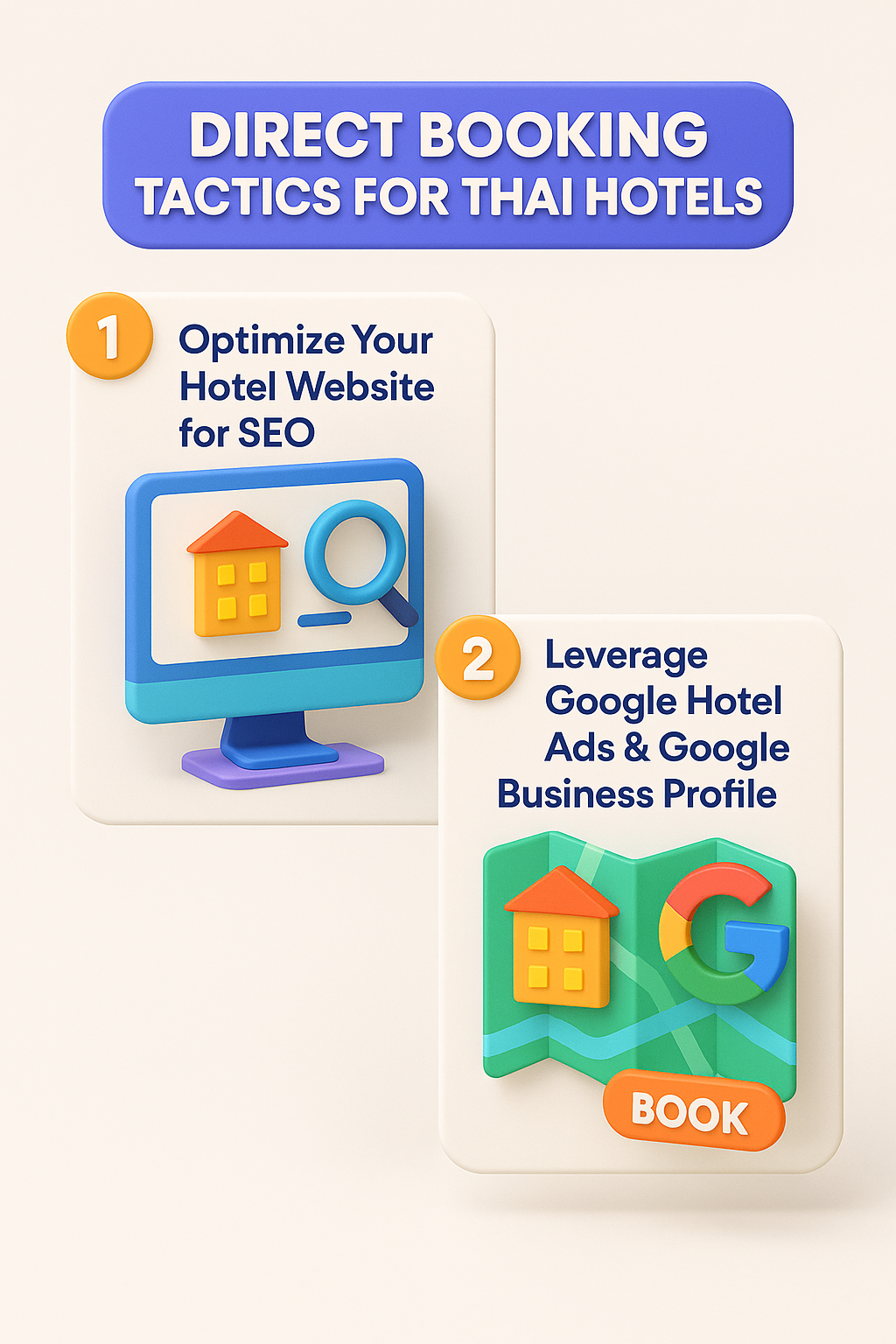
3. Social Media Marketing for Travelers
Instagram, TikTok, and Facebook are powerful channels for hotels in Thailand to reach both locals and tourists. Use visually appealing reels and short videos showcasing rooms, pools, spa treatments, and nearby attractions.
Target geo-specific hashtags (#BangkokHotels, #PhuketResort) and run location-based ads to capture travelers searching for last-minute stays. Encourage user-generated content by offering small rewards for guests who tag your property in their posts. This boosts your hotel’s social proof and helps you rank higher in search when paired with SEO.
4. Loyalty & Referral Programs
Offer incentives for repeat bookings and referrals:
Exclusive discounts for returning guests
Points-based systems redeemable for free nights
Rewards for guests who refer friends or family
These programs keep guests coming back and help reduce reliance on OTA-driven first-time bookings. Make sure your loyalty program is prominently featured on your hotel website and in all email communications.
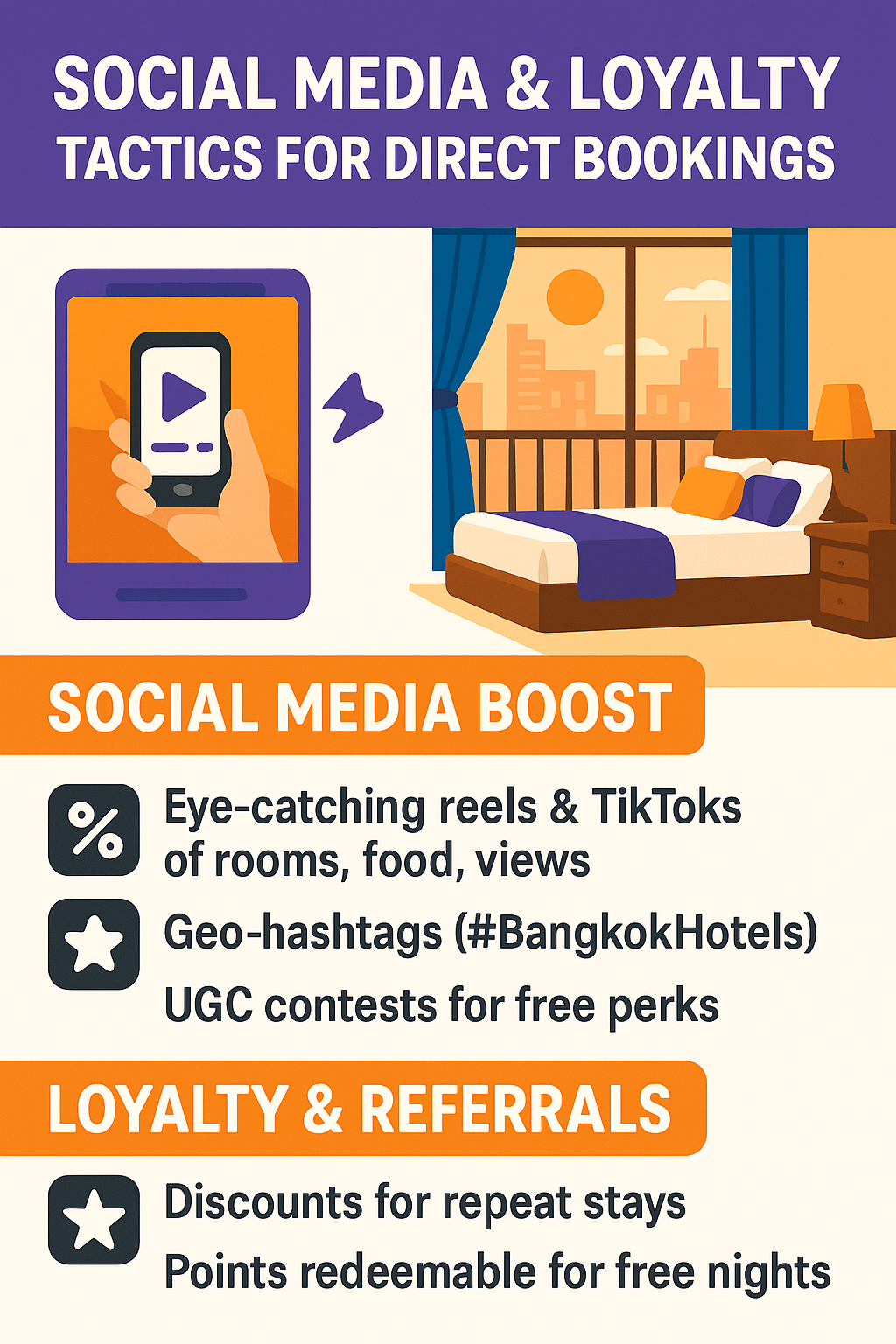
5. Email Marketing & Automated Follow-Ups
Email is one of the most effective channels for hotel remarketing. Collect guest emails during booking and check-in. Use them to send:
Seasonal promotions
Personalized offers based on previous stays
Last-minute deals for low occupancy periods
Automated follow-up sequences can thank guests for staying, ask for reviews, and offer discounts on their next visit. This helps turn one-time guests into repeat direct bookers.
6. High-Impact Content Marketing
Hotels that provide valuable travel content get more organic traffic and longer website visits. Create blog posts, guides, and videos on topics like:
“Best Beaches in Koh Samui”
“3-Day Itinerary for Chiang Rai”
“Top Family-Friendly Activities in Hua Hin”
This type of content attracts travelers during the planning phase, when they’re still deciding on accommodation. Pair it with a strong CTA to “Book Direct for the Best Rates.”
7. Partner with Local Attractions & Influencers
Partnerships can drive direct bookings through referral traffic. Work with:
Local tour companies to create stay + activity packages
Nearby restaurants for exclusive guest discounts
Travel influencers who target your key audience markets
These collaborations expand your reach and provide reasons for travelers to choose your property over competitors listed on OTAs.
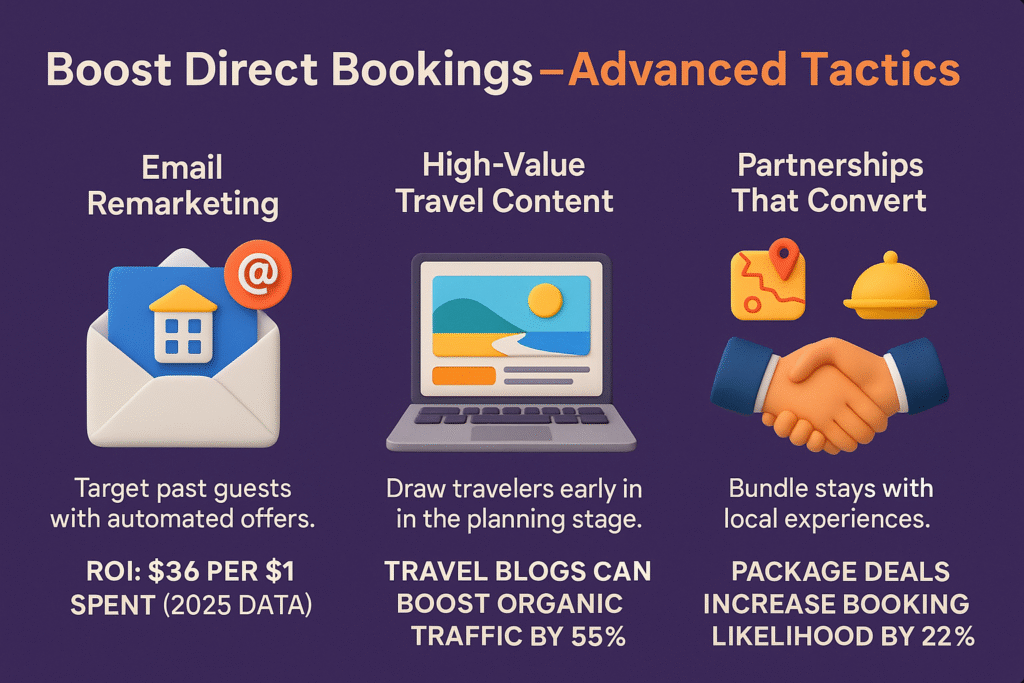
2025 Travel & Booking Trends for Thai Hotels
Before you can increase direct bookings, you need to understand how travelers search, decide, and book in 2025. This data reveals the behaviors, platforms, and technologies shaping the Thai hotel market right now. By studying these trends, you’ll know exactly where to focus your efforts – whether that’s optimizing for mobile bookings, targeting high-value source markets, or using social media to influence travel decisions. Use this table as your roadmap for building a strategy that aligns with guest intent and drives more revenue without relying on OTAs.
| Trend | Meaning | What You Can Do |
|---|---|---|
| 91.2% internet penetration in Thailand (DataReportal) | Most potential guests are online daily. | Keep your hotel visible across Google, social media, and travel platforms. |
| Over 60% of hotel bookings in Thailand are made on mobile (Google Travel 2025) | Travelers prefer booking on their phones. | Optimize your booking engine for mobile-first speed and usability. |
| 32M+ international visitors expected in 2025 (TAT) | Strong global travel demand for Thai hotels. | Create multi-language SEO and marketing for the top source countries. |
| Social media influences over 70% of travel decisions (Statista 2025) | Guests often choose hotels they see online. | Post high-quality visuals, reels, and influencer collaborations. |
| OTA commission rates rising to 25% for some markets (Skift 2025) | Heavy profit loss for OTA bookings. | Offer exclusive perks for guests who book direct. |
Competitive Analysis: Learning from Top-Performing Thai Hotels
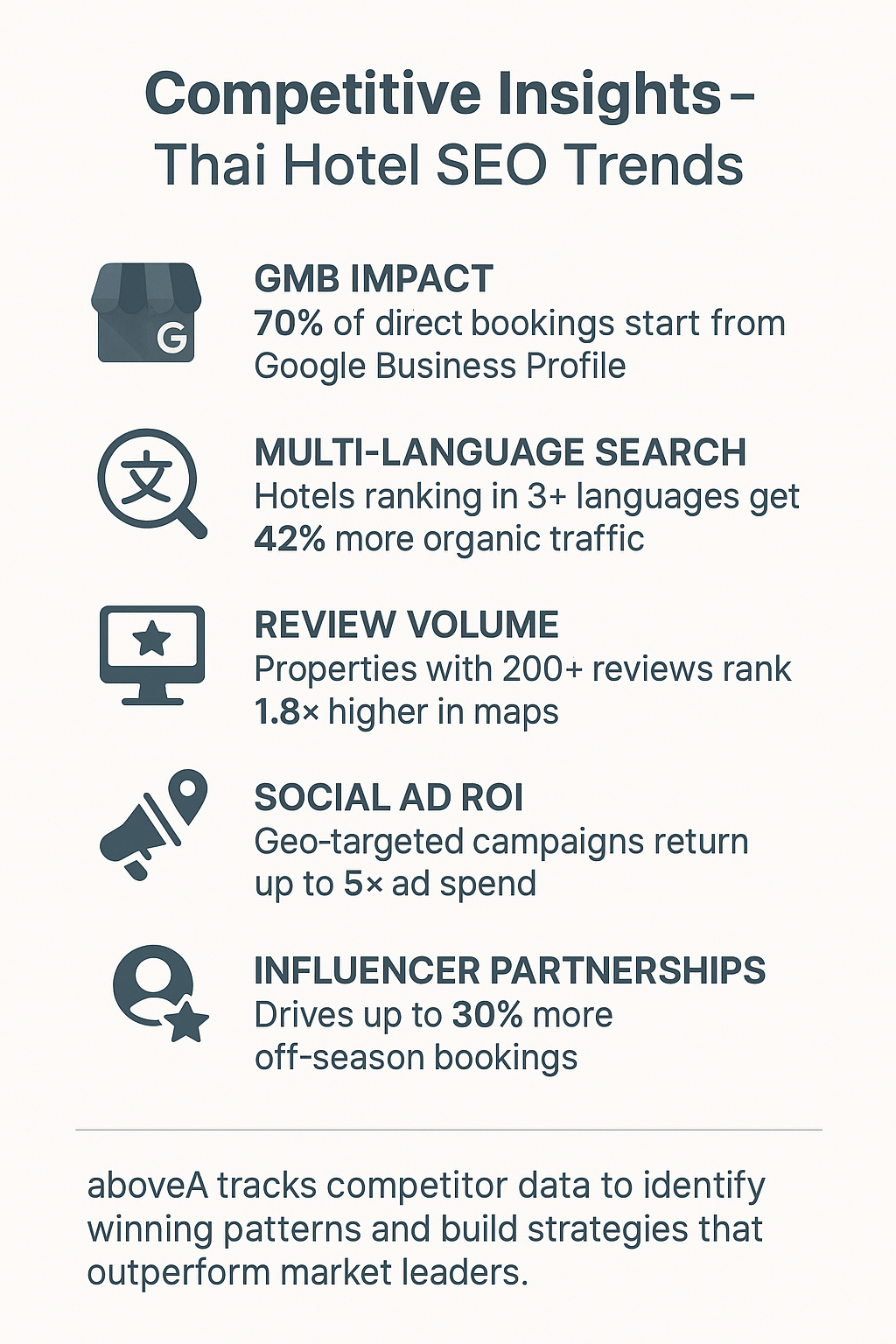
Top hotels in Thailand that win on direct bookings often share these traits:
Fully optimized Google Business Profiles with fresh photos and accurate info.
Multi-language websites ranking for both local and international hotel-related keywords.
High review volumes on Google and TripAdvisor with timely responses.
Active social media engagement with geo-targeted ads.
Partnerships with influencers in target source markets.
aboveA’s Approach: We track competitor keywords, backlink profiles, and social campaigns. This helps us design custom hotel SEO strategies that outperform leaders in your category.
Common Mistakes Hotels Make (and How aboveA Fixes Them)
Even the most beautiful hotels in Thailand can lose direct bookings if their online strategy has gaps. In 2025, guest search behavior is fast-paced and competitive – travelers compare prices, read reviews, and make decisions in minutes. The table below highlights the most common mistakes that cost Thai hotels valuable bookings, explains why they’re harmful in today’s market, and shows how aboveA solves them with strategies built for hotel SEO, multi-language marketing, and conversion-focused design.
| Mistake | Why It Hurts Direct Bookings in Thailand | How aboveA Solves It |
|---|---|---|
| Weak Mobile Booking Experience | With 60%+ of hotel bookings in Thailand made on mobile (Google Travel 2025), slow or hard-to-use booking engines cause drop-offs and lost revenue. | We design mobile-first hotel websites with lightning-fast booking pages, one-click calls, and multilingual support for both domestic and international travelers. |
| No Incentive to Book Direct | Guests often see the same price on OTAs, so they choose the familiar platform. Without added perks, your site won’t win the booking. | We create exclusive offers, complimentary breakfast, spa credits, and late checkout and promote them across Google Business Profile, email, and social ads. |
| Ignoring International SEO | With 32M+ international visitors expected in 2025, failing to target multiple languages misses high-value guests searching in their native language. | We develop multi-language hotel SEO targeting top source markets like China, Japan, Singapore, and Europe, ranking your site in foreign Google results. |
| Poor Follow-Up After Inquiries | Guests who email or call but don’t book right away are often lost to competitors who follow up faster. | We automate personalized follow-up emails with offers and booking links, turning warm leads into confirmed reservations. |
| Inconsistent Branding Across Platforms | Mismatched info on Google Maps, TripAdvisor, and Facebook lowers trust and reduces your Google ranking. | We audit and unify NAP data (Name, Address, Phone) across all platforms, enhance visual consistency, and ensure your messaging aligns with your brand voice. |
Fixing these mistakes isn’t just about better marketing; it’s about aligning your hotel’s entire digital presence with how guests search and book in Thailand. From mobile-first booking engines to incentives that beat OTA offers, every improvement increases the chances that a high-intent traveler will choose you directly. With aboveA’s data-driven approach, these changes don’t just patch weaknesses, they turn your hotel’s online channels into reliable revenue engines.
International Growth for Thai Hotels
Bangkok, Phuket, Chiang Mai, and Koh Samui are magnets for global travelers. To expand direct bookings internationally:
Use multi-language hotel SEO to rank for high-value keywords in source markets like Singapore, Japan, Germany, China, and Australia. Optimize room pages, location guides, and blog content in multiple languages.
Run Google Hotel Ads targeting travelers in their home countries before they arrive. Set up location- and language-specific ad groups to capture booking intent early.
Offer localized seasonal packages such as “Winter Escape Deals for Europe” or “Golden Week Specials for Japanese Travelers,” aligning offers with major foreign holidays and travel peaks.
Create cultural and experience-driven content — highlight authentic Thai food tours, temple visits, spa traditions, and unique local events to appeal to travelers looking for memorable stays.
Partner with international travel influencers whose audience matches your target markets, using reels, YouTube vlogs, and travel blogs to drive awareness and direct booking traffic.
List your property on foreign-language travel forums and review sites, ensuring consistent branding and encouraging guest reviews in their native language.
Use email remarketing in multiple languages for past international guests, offering exclusive repeat-guest discounts and early booking incentives.
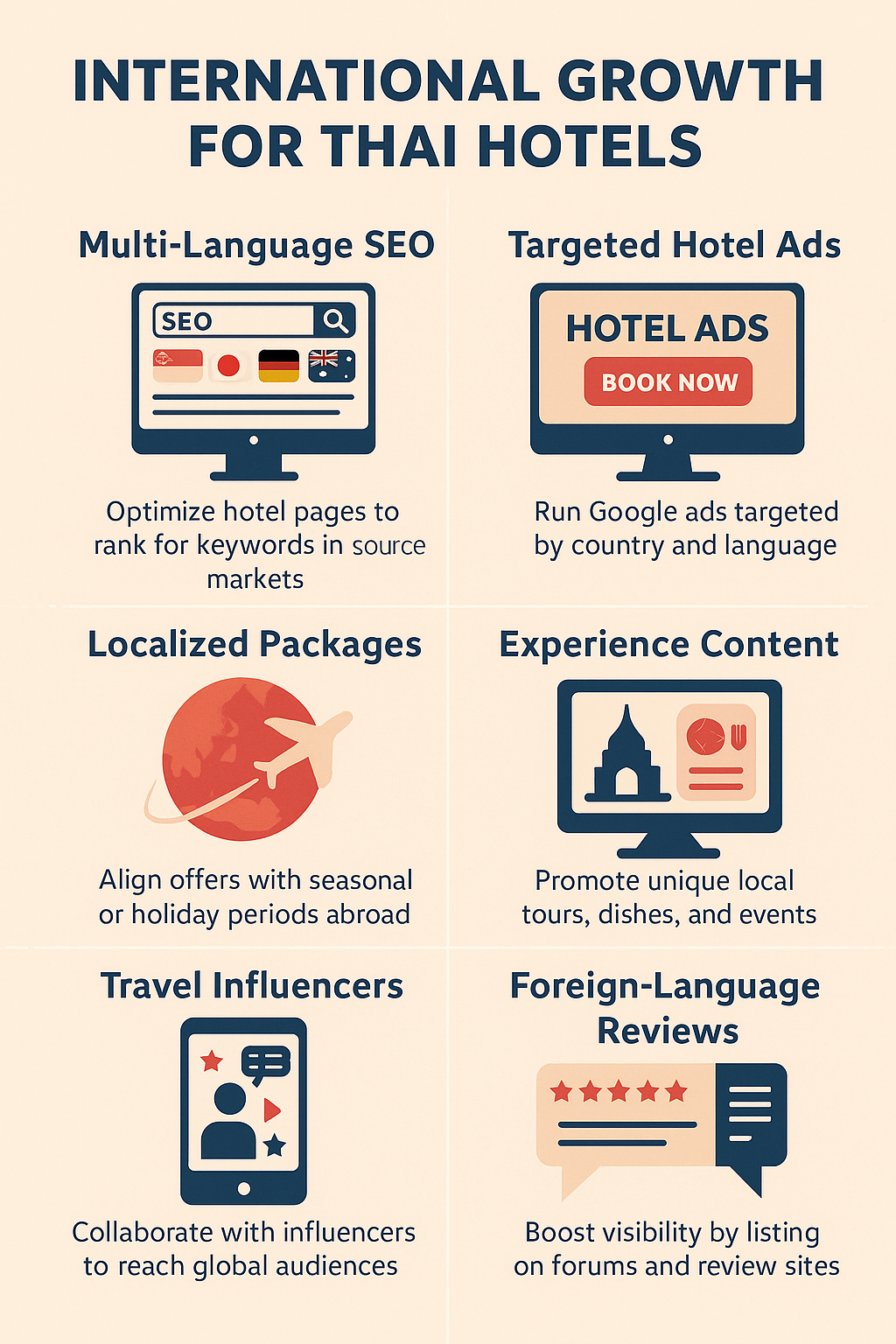
Expanding internationally isn’t about casting the widest net; it’s about targeting the right travelers at the right moment with the right message. By combining multi-language SEO, strategic advertising, tailored seasonal offers, and culturally relevant experiences, Thai hotels can capture high-intent bookings before guests even set foot in the country. This not only drives more direct reservations but also builds a loyal global audience that returns year after year.
Additional Digital Marketing Tactics to Boost Direct Bookings
While SEO, Google Hotel Ads, and loyalty programs are essential for generating direct hotel bookings in Thailand, there’s a broader set of digital marketing strategies that can multiply your results. These suggestions go beyond the basics – combining data-driven marketing, automation, and targeted content creation – to help hotels capture high-intent travelers, convert them directly on their platforms, and build long-term guest relationships without relying on OTAs.
1. Advanced Hotel SEO Audits
A one-time keyword list isn’t enough. An in-depth SEO audit reveals technical issues, broken links, missing schema markup, and content gaps. For Thai hotels, this means ensuring your site structure supports both Thai and international search terms, and that Google can easily display your property in local search and Google Maps results.
2. Marketing Automation for Hotels
Responding to every inquiry manually slows down the booking process. Automation tools can send instant replies in multiple languages, confirm reservations, and follow up with upsell offers. This keeps your hotel front-of-mind for guests and prevents lost leads.
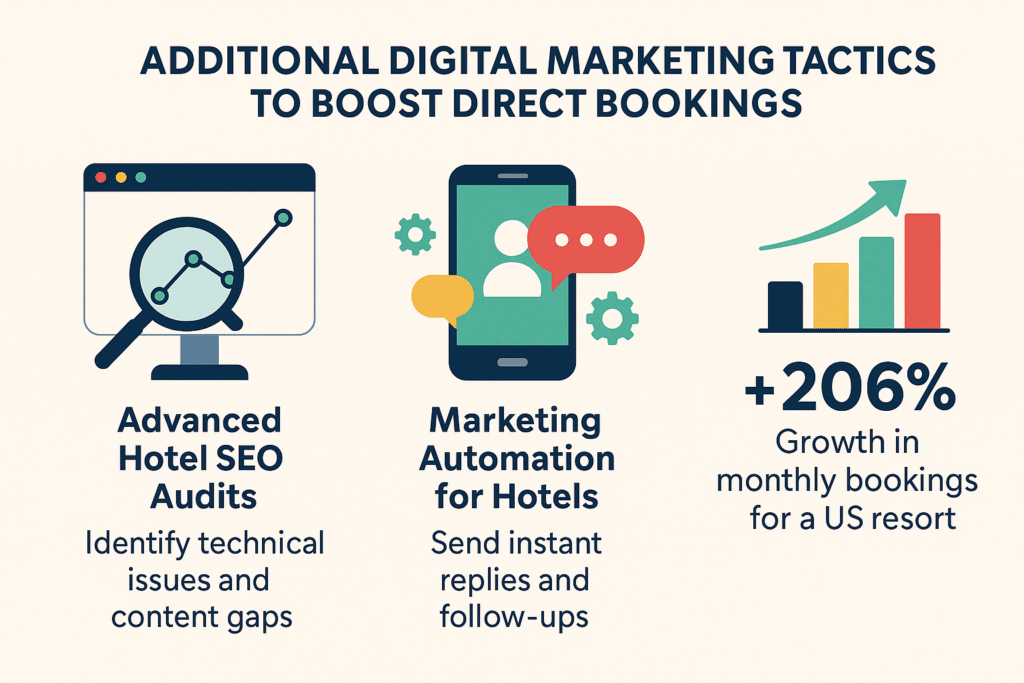
3. Content Localization
Direct translations don’t always persuade. Content should be culturally adapted to resonate with each target market. For example, Japanese travelers may respond to detailed room and amenity descriptions, while European travelers may prefer visual storytelling and experience-driven copy.
4. Paid Media Campaigns
Paid ads on Google, Facebook, and Instagram help Thai hotels target high-value audiences – like tourists searching “best beach resorts in Phuket” – with direct booking offers. Using retargeting, you can re-engage visitors who looked at your rooms but didn’t complete a booking.
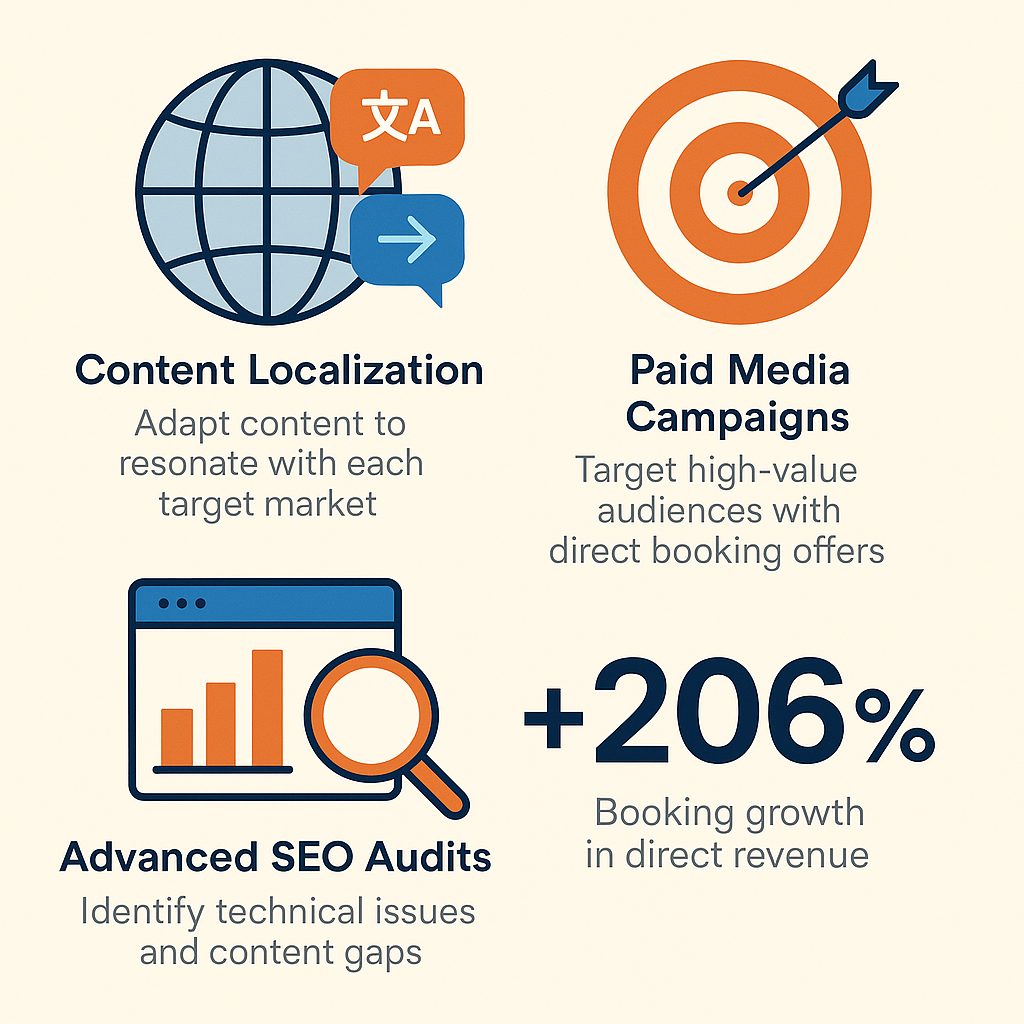
5. Performance Tracking Dashboards
A centralized dashboard connects your website analytics, booking engine data, ad performance, and review scores. For hotel managers, this means every marketing decision is based on real-time data instead of guesswork.
6. Reputation & Review Management
Reviews are critical for both Google ranking and conversion rates. By actively monitoring and responding to guest reviews across platforms – primarily Google and TripAdvisor – you can improve visibility and reassure potential guests before they book.
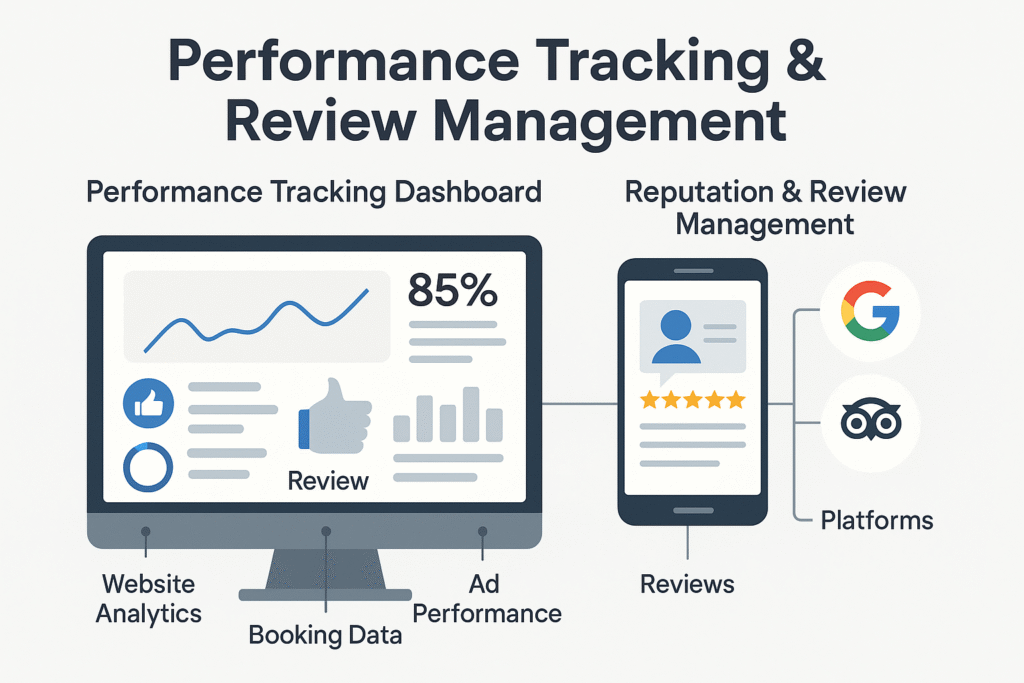
7. Partnership Outreach
Collaborations with airlines, travel agencies, local attractions, and event organizers open up new booking channels. Packages like “Stay + Tour” or “Stay + Spa” can attract travelers who might not have considered your property otherwise.
8. Conversion Rate Optimization (CRO)
CRO focuses on making your booking pages more persuasive. This includes refining the design, simplifying the checkout process, adding trust badges, and A/B testing headlines or calls to action to see what drives the most bookings.
These additional marketing tactics work together to create a complete direct booking ecosystem. Advanced SEO ensures travelers can find you. Automation and localization help you connect with them in the right way. Paid campaigns and CRO convert interest into confirmed bookings, while partnerships and review management extend your reach. By integrating these strategies – all of which align with aboveA’s hotel marketing expertise – Thai hotels can reduce OTA reliance, increase profit margins, and keep guests coming back year after year.
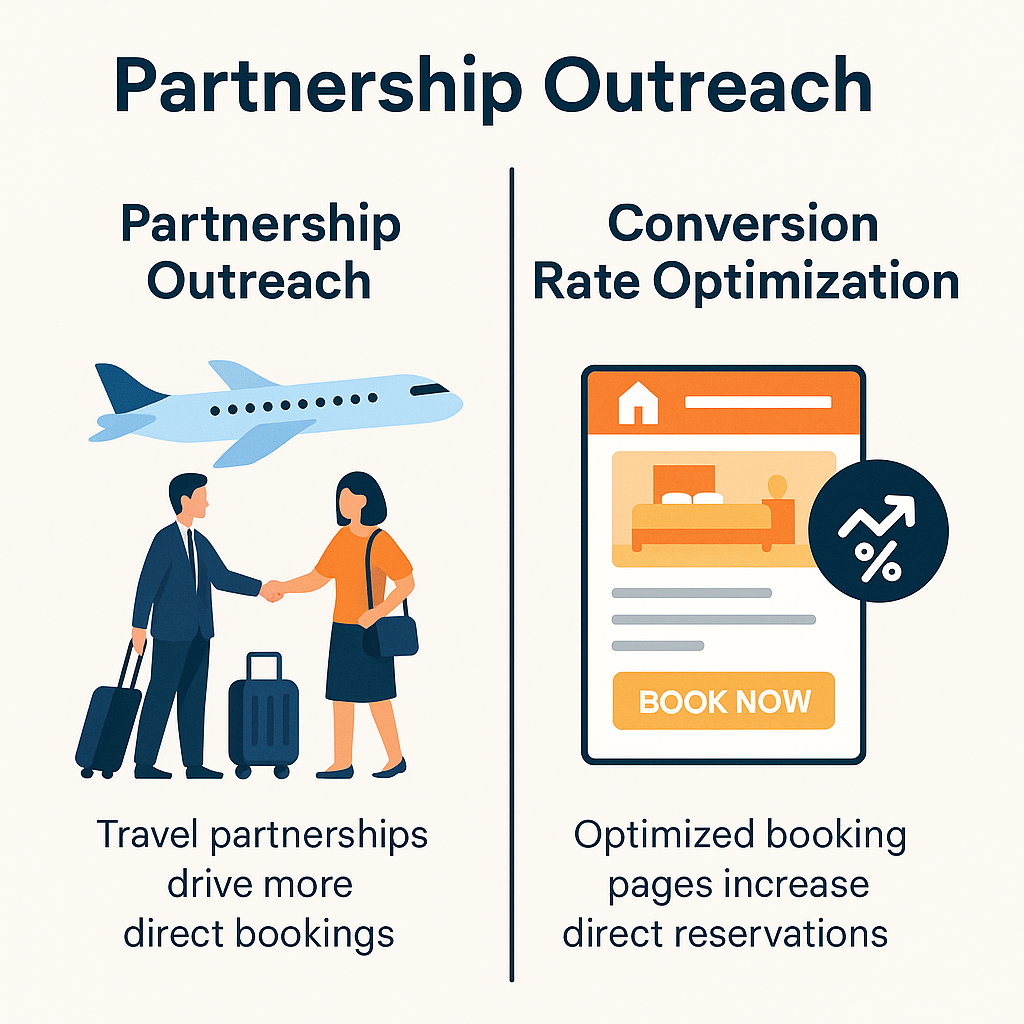
Final Thoughts
In 2025, direct bookings for Thai hotels are more than a profit booster; they’re a survival strategy. By mastering hotel SEO, optimizing for Google Maps and Google Hotel Ads, and targeting both local and international guests with multi-language, mobile-friendly content, your property can break free from OTA dependency.
Every direct booking is a win for your bottom line, your guest relationships, and your brand’s future.
Meet the Author

Faustas Norvaisa
A Growth & Product Expert with 9 years of experience in revenue diversification, international expansion, SEO, and digital marketing. Passionate about scaling businesses and building global brands, he empowers companies to thrive with his motto, "sharing is caring.

